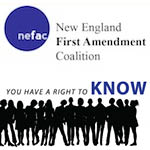 From New England First Amendment Coalition:
From New England First Amendment Coalition:
BOSTON — Suffolk University Law School’s NEFAC chapter hosted a panel discussion as part of NEFAC’s observance of Sunshine Week, exploring the Citizens United Supreme Court decision and its effects on the 2012 elections.The panelists included Jeff Clements, author of “Corporations Are Not People,” Pam Wilmot, executive director of Common Cause of Massachusetts, attorney Gregory V. Sullivan, partner at Malloy & Sullivan of Hingham, and Scott Van Voorhis, Boston-based financial and investigative reporter.The discussion focused on the legal justifications for and the ramifications of Citizens United v. Federal Election Commission, 558 U.S. 310 (a 2010 decision to allow corporations to spend unlimited money on lobbying campaigns that work independently from candidates’ political campaigns, i.e. “super PACs”).The majority opinion relied heavily on the legal premise that spending money is essential to disseminating speech, which was established in Buckley v. Valeo, 424 U.S. 1 (1976). It reasoned that limiting a corporation’s ability to spend money is a First Amendment violation because it limits the ability of its members to associate effectively and to speak on political issues.The Buckley case had interpreted the Federal Election Campaign Act of 1971, which was the first comprehensive effort by the federal government to regulate campaign contributions and spending. Buckley allowed the Federal Election Campaign Act’s limitations on individual campaign contributions and reporting requirements to stand. However, it struck down limitations on individual expenditures on unrelated lobbying organizations and expenditures on a candidate spending his or her own money on his or her campaign.
NEFAC is a member of NFOIC.–eds.
